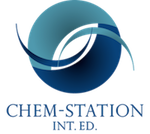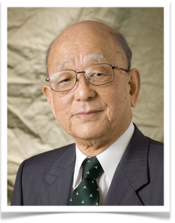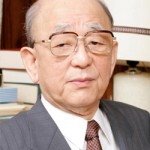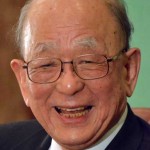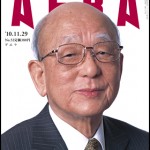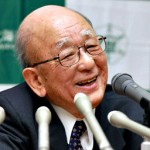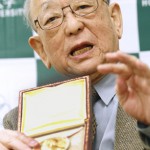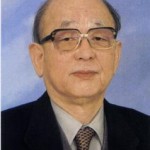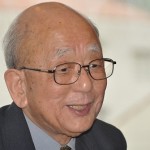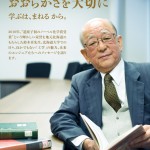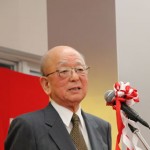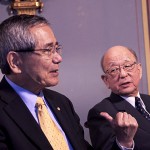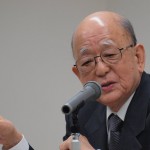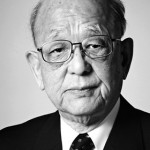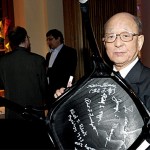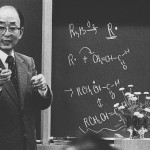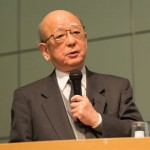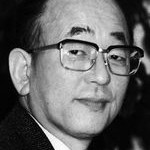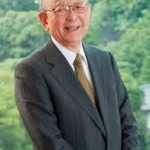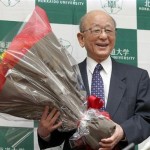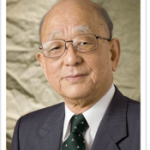Akira, Suzuki (Born in 1930), is Japanese organic chemist. Suzuki was one of the recipients of Nobel prize in Chemistry 2010, with Richard Heck and Ei-ichi Negishi for their research during the 1960s and 70s on palladium-catalyzed coupling reactions in organic synthesis. Their work, carried out independently, laid the foundation for the synthesis of chemicals for uses in such areas as pharmaceuticals, agricultural products, and advanced technological materials.
-
Education and Experiences
1954 BS in Chemistry, Hokkaido Univ.
1959 Ph D in Chemistry, Hokkaido Univ.
1959 Research Assistant, Hokkaido Univ.
1961 Associate Professor, Hokkaido Univ.
1963 Postdoctoral Associate, Purdue Univ., U.S.A., Professor Herbert C. Brown.
1973 Professor, Hokkaido Univ.
1994 Professor, Okayama Univ. of Science.
1995 Professor, Kurashiki Univ. of Science and Arts
2002 Retirement
-
Awards and Honors
1986 Weissberger-Williams Lectureship Award, Eastman Kodak Co.,USA)
1987 Testimonial, Korean Chemical Society
1989 Chemical Society of Japan Award, Chemical Society of Japan.
1994 Professor Emeritus, Hokkaido Univ.
1995 DowElanco Lectureship Award, Ohio State Univ., USA.
2000 Herbert C. Brown Lecturer Award, Purdue Univ., USA.
2001 Weissberger-Williams Lectureship Award., Eastman Kodak Co., USA.
2001 Distinguished Lecturer Award, Queen’s University, Canada and Pfizer Co., USA.
2001 Honorary Member, Argentine Organic Chemistry Society, Argentina.
2004 Synthetic Organic Chemistry Japan Special Award, Society of Synthetic Organic Chemistry, Japan.
2004 Japan Academy Award, Japan Academy.
2005 Honorary Member of Chemical Society of Japan.
2005 Honorary Member of Synthetic Organic Chemistry, Japan.
2005 The Order of the Sacred Treasure, Gold Rays with Neck Ribbon, Japanese Government.
2006 Distinguished Emeritus Professor, Hokkaido University.
2007 Honorary Professor, Shanghai Institute of Organic Chemistry, Chinese Academy of Sciences, China.
2009 Lectured as Plenary speaker at BSF Boron Meeting in March.
2010 Nobel Prize in Chemistry
2010 Person of merit and the Order of Cultural Merit
-
Research
Discovery of Suzuki–Miyaura Cross coupling reaction
In 1979 Suzuki and co-workers reported in two papers that organoboron compounds in the presence of a base can be used as coupling partners in palladium-catalyzed cross coupling with vinyl and aryl halides.[1][2]
Thus, base activation of organoboron reagents as boronate intermediates facilitated the transfer of the organic group from boron to palladium (transmetallation). The reaction has later been extended to also include couplings with alkyl groups.
A further significant development came from the observation that arylboronic acids are able to participate as coupling partners in the palladium-catalyzed cross-coupling reaction. In the latter case the reaction was even more efficient and weaker bases could be employed. The stability and weak nucleophilic nature of organoboron compounds has made this reaction very practical. It tolerates a wide range of functional groups and it is highly chemoselective. Furthermore, boron compounds are generally non-toxic and the reaction can be run under very mild conditions. This has made the reaction popular in the pharmaceutical industry. The reaction is called the Suzuki–Miyaura Cross coupling reaction (excerpt from Nobelprize.org).
-
References
[1] Miyaura, N.; Yamada, K.; Suzuki, A. Tetrahedron Lett. 1979, 3437.
[2] Miyaura, N.; Suzuki, A. J. Chem. Soc. Chem. Commun. 1979, 866.
・Miyaura, N.; Suzuki, A. Chem. Rev. 1995, 95, 2457.
-
Related Links
Akira Suzuki - Wikipedia
Suzuki Reaction - Wikipedia
Suzuki Coupling (organic-chemistry.org)
-
Photo Gallery
-
Movies
-
Related Books
[amazonjs asin=”3527331549″ locale=”US” title=”Metal Catalyzed Cross-Coupling Reactions and More, 3 Volume Set”][amazonjs asin=”1243629606″ locale=”US” title=”Palladium/carbon-catalyzed Suzuki cross- and self-couplings and the development of a lab-scale hydrogenation system.”][amazonjs asin=”0970844190″ locale=”US” title=”Organic Syntheses via Boranes”]
